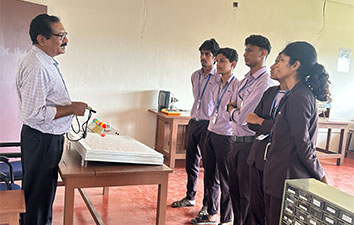 The Workshop serves as the foundational space where students embark on their journey into the world of electronics. It is a hands-on learning environment equipped with essential tools and equipment, fostering the development of fundamental skills in circuit assembly, soldering and basic electronic troubleshooting. It lays the groundwork for more advanced experiments in specialized labs. It provides students with the necessary practical skills to understand and work with electronic components, setting the stage for their academic and professional growth.
The Workshop serves as the foundational space where students embark on their journey into the world of electronics. It is a hands-on learning environment equipped with essential tools and equipment, fostering the development of fundamental skills in circuit assembly, soldering and basic electronic troubleshooting. It lays the groundwork for more advanced experiments in specialized labs. It provides students with the necessary practical skills to understand and work with electronic components, setting the stage for their academic and professional growth.
Electronics & Communication Engineering
lab facilities
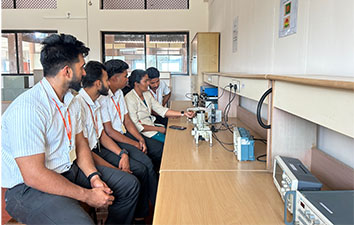 The Communication Lab serves as a dynamic and cutting-edge facility where students immerse themselves in the exploration of communication systems and technologies. This lab is equipped with essential tools and instruments, including microwave benches, Optical Fiber Communication (OFC) equipment for fiber splicing, signal generators and Digital Storage Oscilloscopes (DSOs). These resources empower students to delve into the intricate aspects of communication engineering, allowing them to gain hands-on experience in working with microwave technologies, optical fiber communications and modulation/demodulation techniques. The lab provides a practical environment for students to apply theoretical knowledge, analyse signals and understand the practical implementation of communication technologies.
The Communication Lab serves as a dynamic and cutting-edge facility where students immerse themselves in the exploration of communication systems and technologies. This lab is equipped with essential tools and instruments, including microwave benches, Optical Fiber Communication (OFC) equipment for fiber splicing, signal generators and Digital Storage Oscilloscopes (DSOs). These resources empower students to delve into the intricate aspects of communication engineering, allowing them to gain hands-on experience in working with microwave technologies, optical fiber communications and modulation/demodulation techniques. The lab provides a practical environment for students to apply theoretical knowledge, analyse signals and understand the practical implementation of communication technologies.
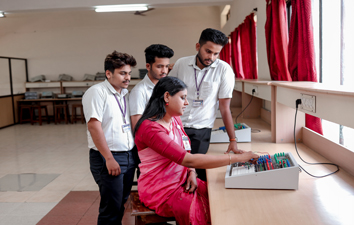 The Integrated Circuits Lab is well-equipped with advanced tools and resources, including digital IC trainer kits, linear integrated circuit components, FPGA kits and essential measurement tools. These facilities enable hands-on exploration of semiconductor devices, providing students with a practical and interactive learning experience. Through the lab activities, students acquire valuable skills in designing and testing integrated circuits, effectively bridging the gap between theoretical knowledge and real-world applications. The utilization of digital IC trainer kits and FPGA kits allows students to delve into logic circuit design, while the inclusion of linear integrated circuit components ensures a comprehensive understanding of both digital and analog electronics. The availability of measurement tools enhances their ability to analyze and troubleshoot circuits, fostering a practical approach to electronics education. Overall, the Integrated Circuits Lab serves as a crucial platform for students to gain practical insights into semiconductor technology and strengthen their competence in the field.
The Integrated Circuits Lab is well-equipped with advanced tools and resources, including digital IC trainer kits, linear integrated circuit components, FPGA kits and essential measurement tools. These facilities enable hands-on exploration of semiconductor devices, providing students with a practical and interactive learning experience. Through the lab activities, students acquire valuable skills in designing and testing integrated circuits, effectively bridging the gap between theoretical knowledge and real-world applications. The utilization of digital IC trainer kits and FPGA kits allows students to delve into logic circuit design, while the inclusion of linear integrated circuit components ensures a comprehensive understanding of both digital and analog electronics. The availability of measurement tools enhances their ability to analyze and troubleshoot circuits, fostering a practical approach to electronics education. Overall, the Integrated Circuits Lab serves as a crucial platform for students to gain practical insights into semiconductor technology and strengthen their competence in the field.
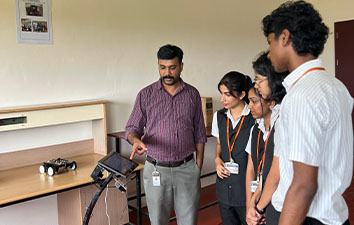 The ECE department's project lab is a dynamic and versatile space designed for projects. Within this lab, students have the opportunity to work on a variety of projects, including both mini and main projects, as well as course projects. Although course projects may not be part of the regular timetable, they are integral to the curriculum, underscoring their significance in enhancing the overall learning experience for students. The project lab is well-equipped with essential components such as Node MCU modules, Arduino and Raspberry Pi boards, GSM and GPS modules and comprehensive sensor kits. These resources empower students to explore and implement diverse applications, allowing them to develop practical skills in embedded systems and IoT. Beyond IoT devices, the lab features specialized training kits, including DSP trainer kits and MPMC trainer kits. These resources serve as a platform for students to delve into advanced concepts in signal processing and microprocessor-based systems.
The ECE department's project lab is a dynamic and versatile space designed for projects. Within this lab, students have the opportunity to work on a variety of projects, including both mini and main projects, as well as course projects. Although course projects may not be part of the regular timetable, they are integral to the curriculum, underscoring their significance in enhancing the overall learning experience for students. The project lab is well-equipped with essential components such as Node MCU modules, Arduino and Raspberry Pi boards, GSM and GPS modules and comprehensive sensor kits. These resources empower students to explore and implement diverse applications, allowing them to develop practical skills in embedded systems and IoT. Beyond IoT devices, the lab features specialized training kits, including DSP trainer kits and MPMC trainer kits. These resources serve as a platform for students to delve into advanced concepts in signal processing and microprocessor-based systems.
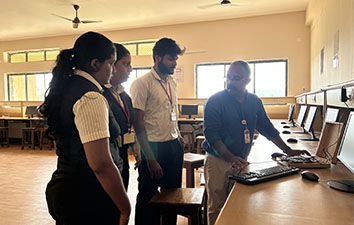 The Microprocessor and Microcontroller (MPMC) Lab is a focal point for students to explore the intricacies of programming and interfacing microprocessors and It is equipped with kits, interfacing devices and development tools. Students gain proficiency in programming these essential components, developing skills crucial for embedded system design. The MPMC Lab bridges the gap between theoretical understanding and practical implementation in real-time embedded systems.
The Microprocessor and Microcontroller (MPMC) Lab is a focal point for students to explore the intricacies of programming and interfacing microprocessors and It is equipped with kits, interfacing devices and development tools. Students gain proficiency in programming these essential components, developing skills crucial for embedded system design. The MPMC Lab bridges the gap between theoretical understanding and practical implementation in real-time embedded systems.
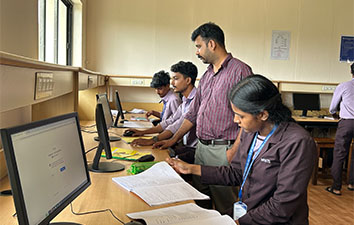 The Systems Lab is a dedicated and specialized space meticulously crafted for students to delve into the intricacies of integrating and controlling complex electronic This innovative lab places a strong emphasis on experiential learning, providing students with hands-on experience using an array of cutting-edge tools and resources. These include DSP trainer kits for exploring digital signal processing, a scientific computing lab for computational experimentation, a C programming lab for honing software development skills, LTspice simulation software for circuit analysis and communication lab simulation tools. Additionally, the lab is equipped with computer systems tailored for interfacing with various electronic components. This comprehensive approach enables students to gain practical insights into the integration, control and simulation of electronic systems, fostering a dynamic learning environment that bridges theory and application in the field of electronics.
The Systems Lab is a dedicated and specialized space meticulously crafted for students to delve into the intricacies of integrating and controlling complex electronic This innovative lab places a strong emphasis on experiential learning, providing students with hands-on experience using an array of cutting-edge tools and resources. These include DSP trainer kits for exploring digital signal processing, a scientific computing lab for computational experimentation, a C programming lab for honing software development skills, LTspice simulation software for circuit analysis and communication lab simulation tools. Additionally, the lab is equipped with computer systems tailored for interfacing with various electronic components. This comprehensive approach enables students to gain practical insights into the integration, control and simulation of electronic systems, fostering a dynamic learning environment that bridges theory and application in the field of electronics.
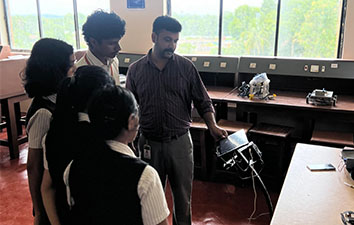 The laboratory is equipped with advanced tools, including the Microchip MPLAB ICD 5 In-Circuit Debugger, which enable real-time debugging of Microchip DSC and MCU devices. Additionally, He-Man Auto Robo Park has generously supported us with high-end industrial components, such as:
The laboratory is equipped with advanced tools, including the Microchip MPLAB ICD 5 In-Circuit Debugger, which enable real-time debugging of Microchip DSC and MCU devices. Additionally, He-Man Auto Robo Park has generously supported us with high-end industrial components, such as:
Communication Module CM 1241 (RS 422/485) – Siemens
Siemens Sematic S7-1200 PLC
Sematic Step 7 Basic V18 Software Package
This comprehensive setup allows students to gain hands-on experience with industry-grade equipment and software, enhancing their practical skills in embedded systems, automation, and industrial communication.
The collaboration with NeST Digital further enriches this lab through industry interactions, expert-led workshops, and advanced technical guidance. By leveraging the resources provided, students have the opportunity to engage in real-world projects and receive mentorship from industry professionals.
Training and Placement Cell
A fully-fledged Training & Placement Cell is working towards better opportunities for its students and bridges the gap between prospective employer and candidate.








































































































